#custom model ship
Text
#oceanliner #ghostship made from a #revell #rmstitanic #custommodel #custommodelship #revelltitanic
instagram
#revell#custom#ocean liner#ghost ship#rms titanic#custom model#custom model ship#revell rms titanic#revell titanic#customised#customs#original content#Instagram
1 note
·
View note
Text

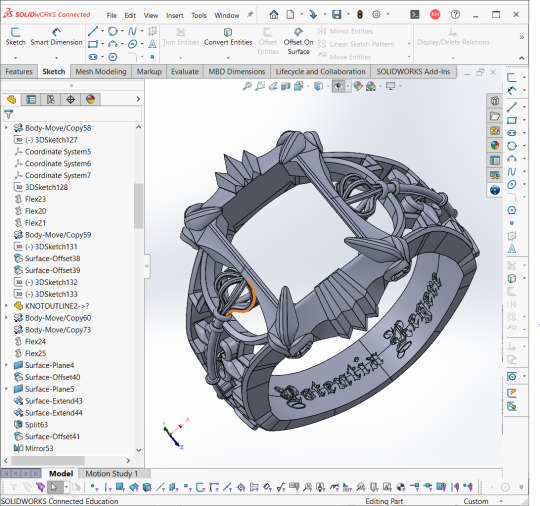



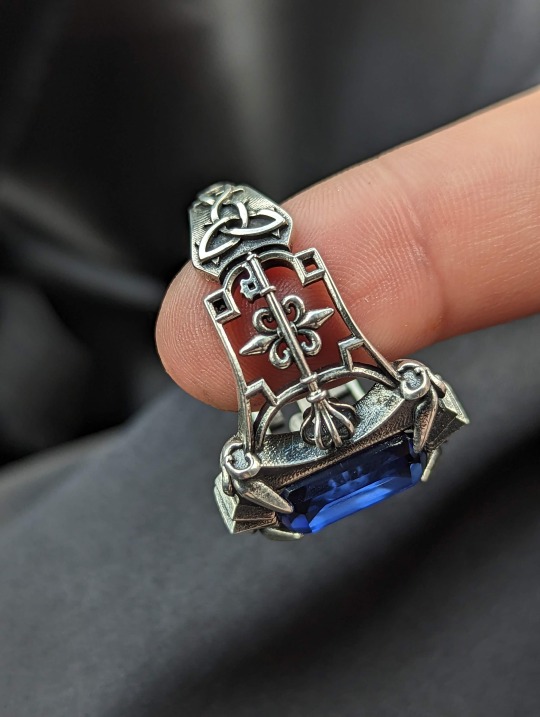
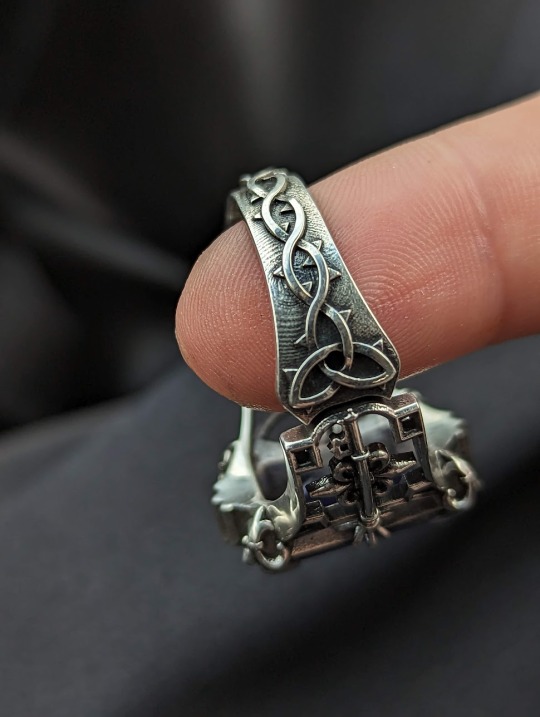
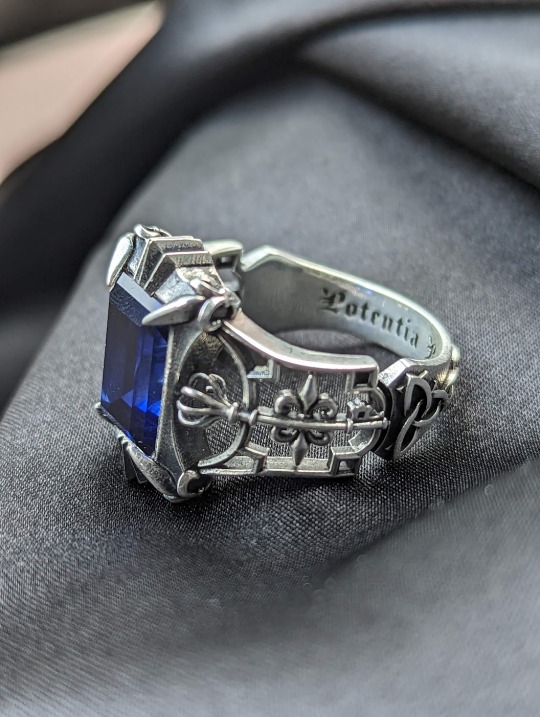
The Phantomhive Ring
Nonofficial merchandise, fanmade, custom.
·3D modeled in SolidWorks by @noirserviteur
·3D printed using resin, then cast in sterling silver
·Fitted with blue sapphire (+ diamond chips, soon)
#Kuroshitsuji#Black butler#ciel phantomhive#Our!Ciel#Ring#I would be very remiss not to make a post about this#I did not believe that this would turn out as beautifully as it did#I also did not believe it could be modeled in the first place this well and even if it could be done#That it would not turn out once it came time to be printed and then cast#But I was wrong multiple times#I also hope someone takes a look at the amount of files and can comprehend the amount of time and effort that went into this#When it got here I just stared at it with my mouth open in disbelief for like 2 hours...#edit because tumblr messed up my post#The little diamond chips will see this to completion but I couldn't wait also I don't even think they're super necessary#They're on the way but international shipping is slow as molasses right now#and unpredictable#anyway-#edit 2 added two more pictures so ppl can see the custom knots and adjustment I asked for#💙
1K notes
·
View notes
Text



Project "Constitution c.1812" nearing her completion - yards and complementary running rigging to go!
#ship model#war of 1812#model design#cherry wood#scale model#constitution#model detail#custom models#custom model
60 notes
·
View notes
Text
There are two configurations available: one with 6GB of RAM and 128GB of storage for $599 and another with 8GB of RAM and 256GB of storage for $679. The storage of both models can be expanded via microSD, and the phone features a modular design that can be easily disassembled using a standard Phillips #00 screwdriver to replace broken components. It also has an IP54 rating, meaning the device is protected against dust and water sprays.
The Murena Fairphone 4 will ship to US customers with 5G and dual SIM support, a removable 3905mAh battery, a 48-megapixel main camera, a 48-megapixel ultrawide, and a 25-megapixel selfie camera. The phones will be available to order exclusively from Murena’s webstore starting today.
22K notes
·
View notes
Video
youtube
KELVIN ENTERPRISE A CUSTOM BUILD
0 notes
Text
Okay, to counteract all my complaining, here are some (lore friendly) mods that I just like a lot (no animals, people, weapons/armors, mesh/texture replacers, etc. because there's too many and it gets boring.)
-
Ghosts of the Deathbells: adds a really rare, somber event to picking a deathbell flower.
Falmeroon: adds Snow Elf ruins to some remote edges of the map. I've made an unofficial SE port here.
Snow Whale Bones: adds the remains of Snow Whales in some mountainous areas (iffy canon but sorry they are Cool.)
Windmills of Skyrim: adds windmills with unique, custom-painted sails to farms.
Scarecrows of Skyrim: adds scarecrows to farms.
Scribes of Skyrim: makes books and notes use a variety of typefaces (any fellow Pentiment fans out there?)
The Old Ways-Nordic Religion: adds totems representing the Nordic pantheon around Skyrim. Has patches for the next recommendation.
The Great Towns/Villages series: overhauls the smaller, worldspace towns in a really cool way, includes voice-acted NPCs. Personally, I like Kynesgrove the best because it actually adds to the lore about the Nordic pantheon. For Shor's Stone, I recommend this mod as well.
Redbag's Rorikstead: I like this mod over Great Village's version because the houses have sod roofs and I'm a sucker for sod roofs.
Capital Windhelm Expansion: adds some really thoughtful lore touches (Dunmer refugees outside the walls, an Arena, and a cool vampire quest)
Relic of Dawnstar: adds a Gehenoth skull to the White Hall (requires Cities of the North), inspired by the lore of the Travels game
Environs series: thoughtful additions that makes certain places change over time.
WiZKid's mods: especially Lund's Hut, Lively Farms, Icy Windhelm, Pinewatch, Hall of the Dead Stained Glass Windows, and Pavo's House. Sepolcri is also pretty good but loses immersion points for using celtic cross gravestones. You can pry Lanterns of Skyrim II from my cold, dead hands, though. Lux? Idk her, LoSII is my bestie.
Fancy Sleeping Tree Replacer: the Sleeping Tree is supposed to be a remnant of the sentient trees of the flying city of Umbriel (from the novels.) It should be weird, is what I'm saying, and this mod makes it alien and beautiful.
Unique Culture Riverwood: a mod that gives Riverwood its own style of farmhouse and a little more personality. The author has also made a mod for Falkreath.
Immersive World Encounters: adds more and edits World Encounters, including encountering faction NPCs out and about (ex. the Companions outside of Whiterun doing Companion-y things in the wilderness).
Glorious Doors of Skyrim: adds some really cool doors. 'nuff said.
Redbag's Dragonreach: adds some unique flair to Jarl Ballin's crib.
Cultured Orc Furniture: replaces generic furniture in Orc Strongholds with custom furniture.
Lavinia's Memorial: adds some gifts from her grieving parents to the little girl's grave in Falkreath. Ouch.
Nocturnal Moths: adds moths that spawn around lanterns at night.
Moons and Stars: fixes the positions of the stars and moons, as well as making moon phases consistent.
DK's Realistic Nord Ships: replaces Skyrim's ships with some gorgeous new models.
Morgenstern's Mushroom Circles: adds more fairy rings in the wilderness. Delightful!
Bloodmoon Brodir Grove: makes the grove in Solstheim a little more like it was in the Morrowind DLC. The mod author also has more mods that bring Bloodmoon details and locations to Solstheim.
Ships of the Horizon: does what it says on the tin.
EVG Animation Variance: the whole animation series by Everglaid is nice (haven't tried Traversal yet, but that is some incredible technology) but I especially like this one for the old people animations
jasperthegnome's houses: these are SO cozy and comfy.
Arctic- Frost Effects Redux: makes frost spells have cooler effects (including 3D ice spikes)
Northern Roads- Let Me Guess Someone Stole Your Sweetroads: a plugin that cuts down on Northern Roads, removing all the landscape changes and bridges and just keeping the clutter. Way more compatible than the original mod.
Skyrim Bridges: this is my favorite bridge mod. There are many, but I like this one best.
Edit: forgot two tiny mods in my original post:
Nightcaller Temple Unique Shrine of Mara: replaces the generic shrine with a wooden shrine Erandur carved
Broken Tower Redoubt Unique Shrine of Dibella: similar to the above mod, but Reachmen carved this one.
515 notes
·
View notes
Text
The moral injury of having your work enshittified

This Monday (November 27), I'm appearing at the Toronto Metro Reference Library with Facebook whistleblower Frances Haugen.
On November 29, I'm at NYC's Strand Books with my novel The Lost Cause, a solarpunk tale of hope and danger that Rebecca Solnit called "completely delightful."

This week, I wrote about how the Great Enshittening – in which all the digital services we rely on become unusable, extractive piles of shit – did not result from the decay of the morals of tech company leadership, but rather, from the collapse of the forces that discipline corporate wrongdoing:
https://locusmag.com/2023/11/commentary-by-cory-doctorow-dont-be-evil/
The failure to enforce competition law allowed a few companies to buy out their rivals, or sell goods below cost until their rivals collapsed, or bribe key parts of their supply chain not to allow rivals to participate:
https://www.engadget.com/google-reportedly-pays-apple-36-percent-of-ad-search-revenues-from-safari-191730783.html
The resulting concentration of the tech sector meant that the surviving firms were stupendously wealthy, and cozy enough that they could agree on a common legislative agenda. That regulatory capture has allowed tech companies to violate labor, privacy and consumer protection laws by arguing that the law doesn't apply when you use an app to violate it:
https://pluralistic.net/2023/04/12/algorithmic-wage-discrimination/#fishers-of-men
But the regulatory capture isn't just about preventing regulation: it's also about creating regulation – laws that make it illegal to reverse-engineer, scrape, and otherwise mod, hack or reconfigure existing services to claw back value that has been taken away from users and business customers. This gives rise to Jay Freeman's perfectly named doctrine of "felony contempt of business-model," in which it is illegal to use your own property in ways that anger the shareholders of the company that sold it to you:
https://pluralistic.net/2023/11/09/lead-me-not-into-temptation/#chamberlain
Undisciplined by the threat of competition, regulation, or unilateral modification by users, companies are free to enshittify their products. But what does that actually look like? I say that enshittification is always precipitated by a lost argument.
It starts when someone around a board-room table proposes doing something that's bad for users but good for the company. If the company faces the discipline of competition, regulation or self-help measures, then the workers who are disgusted by this course of action can say, "I think doing this would be gross, and what's more, it's going to make the company poorer," and so they win the argument.
But when you take away that discipline, the argument gets reduced to, "Don't do this because it would make me ashamed to work here, even though it will make the company richer." Money talks, bullshit walks. Let the enshittification begin!
https://pluralistic.net/2023/11/22/who-wins-the-argument/#corporations-are-people-my-friend
But why do workers care at all? That's where phrases like "don't be evil" come into the picture. Until very recently, tech workers participated in one of history's tightest labor markets, in which multiple companies with gigantic war-chests bid on their labor. Even low-level employees routinely fielded calls from recruiters who dangled offers of higher salaries and larger stock grants if they would jump ship for a company's rival.
Employers built "campuses" filled with lavish perks: massages, sports facilities, daycare, gourmet cafeterias. They offered workers generous benefit packages, including exotic health benefits like having your eggs frozen so you could delay fertility while offsetting the risks normally associated with conceiving at a later age.
But all of this was a transparent ruse: the business-case for free meals, gyms, dry-cleaning, catering and massages was to keep workers at their laptops for 10, 12, or even 16 hours per day. That egg-freezing perk wasn't about helping workers plan their families: it was about thumbing the scales in favor of working through your entire twenties and thirties without taking any parental leave.
In other words, tech employers valued their employees as a means to an end: they wanted to get the best geeks on the payroll and then work them like government mules. The perks and pay weren't the result of comradeship between management and labor: they were the result of the discipline of competition for labor.
This wasn't really a secret, of course. Big Tech workers are split into two camps: blue badges (salaried employees) and green badges (contractors). Whenever there is a slack labor market for a specific job or skill, it is converted from a blue badge job to a green badge job. Green badges don't get the food or the massages or the kombucha. They don't get stock or daycare. They don't get to freeze their eggs. They also work long hours, but they are incentivized by the fear of poverty.
Tech giants went to great lengths to shield blue badges from green badges – at some Google campuses, these workforces actually used different entrances and worked in different facilities or on different floors. Sometimes, green badge working hours would be staggered so that the armies of ragged clickworkers would not be lined up to badge in when their social betters swanned off the luxury bus and into their airy adult kindergartens.
But Big Tech worked hard to convince those blue badges that they were truly valued. Companies hosted regular town halls where employees could ask impertinent questions of their CEOs. They maintained freewheeling internal social media sites where techies could rail against corporate foolishness and make Dilbert references.
And they came up with mottoes.
Apple told its employees it was a sound environmental steward that cared about privacy. Apple also deliberately turned old devices into e-waste by shredding them to ensure that they wouldn't be repaired and compete with new devices:
https://pluralistic.net/2023/09/22/vin-locking/#thought-differently
And even as they were blocking Facebook's surveillance tools, they quietly built their own nonconsensual mass surveillance program and lied to customers about it:
https://pluralistic.net/2022/11/14/luxury-surveillance/#liar-liar
Facebook told employees they were on a "mission to connect every person in the world," but instead deliberately sowed discontent among its users and trapped them in silos that meant that anyone who left Facebook lost all their friends:
https://www.eff.org/deeplinks/2021/08/facebooks-secret-war-switching-costs
And Google promised its employees that they would not "be evil" if they worked at Google. For many googlers, that mattered. They wanted to do something good with their lives, and they had a choice about who they would work for. What's more, they did make things that were good. At their high points, Google Maps, Google Mail, and of course, Google Search were incredible.
My own life was totally transformed by Maps: I have very poor spatial sense, need to actually stop and think to tell my right from my left, and I spent more of my life at least a little lost and often very lost. Google Maps is the cognitive prosthesis I needed to become someone who can go anywhere. I'm profoundly grateful to the people who built that service.
There's a name for phenomenon in which you care so much about your job that you endure poor conditions and abuse: it's called "vocational awe," as coined by Fobazi Ettarh:
https://www.inthelibrarywiththeleadpipe.org/2018/vocational-awe/
Ettarh uses the term to apply to traditionally low-waged workers like librarians, teachers and nurses. In our book Chokepoint Capitalism, Rebecca Giblin and I talked about how it applies to artists and other creative workers, too:
https://chokepointcapitalism.com/
But vocational awe is also omnipresent in tech. The grandiose claims to be on a mission to make the world a better place are not just puffery – they're a vital means of motivating workers who can easily quit their jobs and find a new one to put in 16-hour days. The massages and kombucha and egg-freezing are not framed as perks, but as logistical supports, provided so that techies on an important mission can pursue a shared social goal without being distracted by their balky, inconvenient meatsuits.
Steve Jobs was a master of instilling vocational awe. He was full of aphorisms like "we're here to make a dent in the universe, otherwise why even be here?" Or his infamous line to John Sculley, whom he lured away from Pepsi: "Do you want to sell sugar water for the rest of your life or come with me and change the world?"
Vocational awe cuts both ways. If your workforce actually believes in all that high-minded stuff, if they actually sacrifice their health, family lives and self-care to further the mission, they will defend it. That brings me back to enshittification, and the argument: "If we do this bad thing to the product I work on, it will make me hate myself."
The decline in market discipline for large tech companies has been accompanied by a decline in labor discipline, as the market for technical work grew less and less competitive. Since the dotcom collapse, the ability of tech giants to starve new entrants of market oxygen has shrunk techies' dreams.
Tech workers once dreamed of working for a big, unwieldy firm for a few years before setting out on their own to topple it with a startup. Then, the dream shrank: work for that big, clumsy firm for a few years, then do a fake startup that makes a fake product that is acquihired by your old employer, as an incredibly inefficient and roundabout way to get a raise and a bonus.
Then the dream shrank again: work for a big, ugly firm for life, but get those perks, the massages and the kombucha and the stock options and the gourmet cafeteria and the egg-freezing. Then it shrank again: work for Google for a while, but then get laid off along with 12,000 co-workers, just months after the company does a stock buyback that would cover all those salaries for the next 27 years:
https://pluralistic.net/2023/09/10/the-proletarianization-of-tech-workers/
Tech workers' power was fundamentally individual. In a tight labor market, tech workers could personally stand up to their bosses. They got "workplace democracy" by mouthing off at town hall meetings. They didn't have a union, and they thought they didn't need one. Of course, they did need one, because there were limits to individual power, even for the most in-demand workers, especially when it came to ghastly, long-running sexual abuse from high-ranking executives:
https://www.nytimes.com/2018/10/25/technology/google-sexual-harassment-andy-rubin.html
Today, atomized tech workers who are ordered to enshittify the products they take pride in are losing the argument. Workers who put in long hours, missed funerals and school plays and little league games and anniversaries and family vacations are being ordered to flush that sacrifice down the toilet to grind out a few basis points towards a KPI.
It's a form of moral injury, and it's palpable in the first-person accounts of former workers who've exited these large firms or the entire field. The viral "Reflecting on 18 years at Google," written by Ian Hixie, vibrates with it:
https://ln.hixie.ch/?start=1700627373
Hixie describes the sense of mission he brought to his job, the workplace democracy he experienced as employees' views were both solicited and heeded. He describes the positive contributions he was able to make to a commons of technical standards that rippled out beyond Google – and then, he says, "Google's culture eroded":
Decisions went from being made for the benefit of users, to the benefit of Google, to the benefit of whoever was making the decision.
In other words, techies started losing the argument. Layoffs weakened worker power – not just to defend their own interest, but to defend the users interests. Worker power is always about more than workers – think of how the 2019 LA teachers' strike won greenspace for every school, a ban on immigration sweeps of students' parents at the school gates and other community benefits:
https://pluralistic.net/2023/04/23/a-collective-bargain/
Hixie attributes the changes to a change in leadership, but I respectfully disagree. Hixie points to the original shareholder letter from the Google founders, in which they informed investors contemplating their IPO that they were retaining a controlling interest in the company's governance so that they could ignore their shareholders' priorities in favor of a vision of Google as a positive force in the world:
https://abc.xyz/investor/founders-letters/ipo-letter/
Hixie says that the leadership that succeeded the founders lost sight of this vision – but the whole point of that letter is that the founders never fully ceded control to subsequent executive teams. Yes, those executive teams were accountable to the shareholders, but the largest block of voting shares were retained by the founders.
I don't think the enshittification of Google was due to a change in leadership – I think it was due to a change in discipline, the discipline imposed by competition, regulation and the threat of self-help measures. Take ads: when Google had to contend with one-click adblocker installation, it had to constantly balance the risk of making users so fed up that they googled "how do I block ads?" and then never saw another ad ever again.
But once Google seized the majority of the mobile market, it was able to funnel users into apps, and reverse-engineering an app is a felony (felony contempt of business-model) under Section 1201 of the Digital Millennium Copyright Act. An app is just a web-page wrapped in enough IP to make it a crime to install an ad-blocker.
And as Google acquired control over the browser market, it was likewise able to reduce the self-help measures available to browser users who found ads sufficiently obnoxious to trigger googling "how do I block ads?" The apotheosis of this is the yearslong campaign to block adblockers in Chrome, which the company has sworn it will finally do this coming June:
https://www.tumblr.com/tevruden/734352367416410112/you-have-until-june-to-dump-chrome
My contention here is not that Google's enshittification was precipitated by a change in personnel via the promotion of managers who have shitty ideas. Google's enshittification was precipitated by a change in discipline, as the negative consequences of heeding those shitty ideas were abolished thanks to monopoly.
This is bad news for people like me, who rely on services like Google Maps as cognitive prostheses. Elizabeth Laraki, one of the original Google Maps designers, has published a scorching critique of the latest GMaps design:
https://twitter.com/elizlaraki/status/1727351922254852182
Laraki calls out numerous enshittificatory design-choices that have left Maps screens covered in "crud" – multiple revenue-maximizing elements that come at the expense of usability, shifting value from users to Google.
What Laraki doesn't say is that these UI elements are auctioned off to merchants, which means that the business that gives Google the most money gets the greatest prominence in Maps, even if it's not the best merchant. That's a recurring motif in enshittified tech platforms, most notoriously Amazon, which makes $31b/year auctioning off top search placement to companies whose products aren't relevant enough to your query to command that position on their own:
https://pluralistic.net/2023/04/25/greedflation/#commissar-bezos
Enshittification begets enshittification. To succeed on Amazon, you must divert funds from product quality to auction placement, which means that the top results are the worst products:
https://pluralistic.net/2023/11/06/attention-rents/#consumer-welfare-queens
The exception is searches for Apple products: Apple and Amazon have a cozy arrangement that means that searches for Apple products are a timewarp back to the pre-enshittification Amazon, when the company worried enough about losing your business to heed the employees who objected to sacrificing search quality as part of a merchant extortion racket:
https://www.businessinsider.com/amazon-gives-apple-special-treatment-while-others-suffer-junk-ads-2023-11
Not every tech worker is a tech bro, in other words. Many workers care deeply about making your life better. But the microeconomics of the boardroom in a monopolized tech sector rewards the worst people and continuously promotes them. Forget the Peter Principle: tech is ruled by the Sam Principle.
As OpenAI went through four CEOs in a single week, lots of commentators remarked on Sam Altman's rise and fall and rise, but I only found one commentator who really had Altman's number. Writing in Today in Tabs, Rusty Foster nailed Altman to the wall:
https://www.todayintabs.com/p/defective-accelerationism
Altman's history goes like this: first, he founded a useless startup that raised $30m, only to be acquired and shuttered. Then Altman got a job running Y Combinator, where he somehow failed at taking huge tranches of equity from "every Stanford dropout with an idea for software to replace something Mommy used to do." After that, he founded OpenAI, a company that he claims to believe presents an existential risk to the entire human risk – which he structured so incompetently that he was then forced out of it.
His reward for this string of farcical, mounting failures? He was put back in charge of the company he mis-structured despite his claimed belief that it will destroy the human race if not properly managed.
Altman's been around for a long time. He founded his startup in 2005. There've always been Sams – of both the Bankman-Fried varietal and the Altman genus – in tech. But they didn't get to run amok. They were disciplined by their competitors, regulators, users and workers. The collapse of competition led to an across-the-board collapse in all of those forms of discipline, revealing the executives for the mediocre sociopaths they always were, and exposing tech workers' vocational awe for the shabby trick it was from the start.

If you'd like an essay-formatted version of this post to read or share, here's a link to it on pluralistic.net, my surveillance-free, ad-free, tracker-free blog:
https://pluralistic.net/2023/11/25/moral-injury/#enshittification
#pluralistic#moral injury#enshittification#worker power#google#dont be evil#monopoly#sam altman#openai#vocational awe#making a dent in the universe
557 notes
·
View notes
Text
Fragility
Yandere!Kafka x Fem!Reader
wc: ~1k words
cw: manipulative themes, yandere, sad times all around, slightly suggestive (nothing happens, kafka is just flirty and touchy lol)
a/n: butterflies have always resonated with me so peep the symbolism I added, also if you know about the meaning behind Ball Peonies in HSR, kudos to you ;)
inspired by this post

Life has many forms of entertainment, yet never enough time to indulge in the splendorous display that each corner of the galaxy can offer you. As a child, you reveled in the entertainment that your own mind provided. As such, you never did enjoy playing with toys much. Lonely, dusty dolls laid untouched, the latest models that were limited edition and inspired by the trendiest media of your time – also left in the wayside.
To many, your lack of interest was skewed as ungratefulness.
To you, that was a sliver of vanity to pride yourself in. After all, nothing could ever erode the endless possibilities of the mind, no, not even age. Your mind was your own and no one could hope to take it from you.
It isn’t long before the object of your disdain stands in the doorway before you. She never could stay away from you for very long.
“You really should smile more, you know. Frown lines would ruin that cute face of yours,” she drawls out. A sharpened nail traces the edge of your cheekbone, lightly trailing down until it reaches the junction of your jawline and erratic pulse in your neck.
A warning, it seems. A deliciously dangerous, intoxicating warning that beckoned you in a never-ending push and pull dynamic. Kafka was always a master of that game. No matter how often you tried to read her, to outsmart her, to play into her hands and exhaust her options, your efforts never bore any fruit. In a way, Kafka admired the duality of your spirit, and found it endlessly cute.
Fragility would always be the most beautiful thing to her.
“...but all beautiful things have one thing in common: they are fragile. The more fragile something is, the rarer it is. Maybe that’s what makes its mere existence so precious.”
As such, you get flashbacks of your first encounter with her on Belebog; long before you knew her true nature, long before you knew what she was capable of. You were, after all, a simple floral assistant that droned throughout your days. Yet, the monotony was always comforting. It kept you grounded in life, in a world that never seemed to change. Almost like the fairytale books you read as a child.
When you had met Kafka, she was captivating in the most severe sense; her mere presence drew in everyone around her. You’d never seen her before, never had her as a customer, yet her unmistakable charm drew you right into her carefully woven web.
Her cute, fragile, little butterfly.
You never imagined that the skincare she gifted you was created from your own flowers; ingredients that contained a calming, drowsy effect. No wonder you were so compliant and limp. You were the one who sold her those flowers in the first place. Your naivety was your own undoing. You had no one to blame but yourself. Especially not when the woman inches closer, careful to close and lock the door behind her; hiding you away from the rest of the ship’s crew, from the rest of the galaxy.
Vast distance turns into closeness and suddenly, the flowers that used to be your favorite; sitting so pretty on the nightstand of your room – became repulsive. Kafka continued to use them on you, to keep you compliant. Yet, at the end of the day, you let her.
Kafka sits you both down on the bed, sprawling your legs out in front of her and situating herself so that her back may be flush with the steely wall of the ship’s room. Her nimble arms wrap around you, her pointed chin digs into your shoulder and she sighs in content.
“A smart move,” she begins, “watching me.” Her grip around you tightens by a fraction. “You managed to figure out that the key card I carried was specific to my genetic code and that I was the only one able to unlock your room and others.” A poisonous kiss to your cheekbone. “You also managed to sneak a lock of my hair and find a fingerprint to recreate my genetic code in a futile attempt to escape. Heh, amusing but – we all know how that played out, right, my darling?”
Of course you remembered. Kafka switched the cards, changed the key codes, and reset all main codes so that you’d get caught before finding an escape. She’d anticipated everything and beat you at your own child’s game.
Kafka sighs and inhales the natural scent of your shampoo: her personal taste in shampoo that she forced you to use. “The ball peonies are growing well, aren’t they?”
You force a lump down your throat and nod meekly. Kafka turns you gently to face her, swirling lavender hues tracing the features of your eyes down to your lips.
“We should stay like this a while. Would you mind if I kissed you, sweetheart?”
A beat of silence. You hardly want to look at her, let alone answer this predatory captor holding you so closely.
“I need your permission. I need your words before I do anything.”
“You may.” Kafka stares deep into your eyes, scouring your expression with scrutiny before letting out a tiny chuckle.
“That’s my good girl. My sweet butterfly,” she leaves a gentle kiss on your forehead. “Now, lay down and let me take care of you.”
You allow her, boneless as you are; who are you to fight back anymore? Should you? Would your family want you to? Before you know it, a tear dribbles down your cheek and onto your jaw, falling and evaporating silently. Kafka kisses the spot on your upper neck where the tear remained while you stare up at the icy ceiling of your room. Wandering hands of hers were not felt, the chill of the room left you numb once your bare skin was visible.
Ball peonies were no longer your favorite flower.
ॱ⋅.˳˳.⋅˙ॱᐧ.˳˳.⋅ઇଓ
#yandere kafka#tw yandere#kafka x reader#yandere kafka x reader#hsr kafka x reader#hsr kafka#yandere hsr#yandere star rail#hsr x you#hsr x reader#yandere hsr x reader#yandere hsr x you#yandere honkai star rail
203 notes
·
View notes
Note
Amber skies question: I'm very interested in the postal service mouse folk in your setting! What sort of initation/training would someone need to go through to join the postal service? Also, in the rig cartalk show, they talked about the rigs used by the postal service, so I'm curious if there's rig-smiths within the postal service, or if it's a situation of them just having long running trade agreements and favored models of rig when trading?
Hope you're having a good one, love your work!
It's actually a rabbinical system. Becoming a posthand is an arduous process that involves a lot of memorizing philosophy around the importance of proper archive management and information flow, library sciences, and the importance of the preservation of history. You have to have a current posthand who acts as a sort of sponsor/mentor through the process, and you are eventually evaluated by a panel of higher ranking posthands.
It takes roughly four years of training to join as an initiate posthand, and then another four of active route service under a mentor before you become a full member. It's a dangerous job that many small communities rely upon. The standards are taken quite seriously.
Rigsmiths are generally part of a guild. Recently, the postal service contracts with a rig shop out of the Teykile, where they produce the ALBATROSS, PELICAN, and KINGFISHER model rigs, which are themselves pattered after 2nd era reframes of an old-world military shipping surplus rig, the EXO U4. The postal service custom-orders these models in bulk, and they we're designed to postal service specifications.
Generally they contract for new models every four to five years depending on need and price point. However, postal outposts generally have an on-site pit crew. (Usually one guy, who charges reasonable prices for civilians if you need a tune up.)
475 notes
·
View notes
Text
“Did I step on your moment?” | Steve Rogers
𝐏𝐚𝐢𝐫𝐢𝐧𝐠 -> Steve Rogers x SHIELD!Agent!Female!Reader
𝐒𝐮𝐦𝐦𝐚𝐫𝐲 -> Natasha, Steve and you are on a mission but when you need to hide things are heated between Steve and you.
𝐖𝐨𝐫𝐝𝐜𝐨𝐮𝐧𝐭 -> 634
𝐖𝐚𝐫𝐧𝐢𝐧𝐠𝐬 -> (G) none, just fluff
𝐄𝐯𝐞𝐧𝐭𝐬 -> 10 Years Anniversary CA:TWS | March 29 | Theme: Natasha Romanoff | Mall, Disguise, Matchmaking, “Did I step on your moment?”, Favorite Natasha quote | @catws-anniversary
Masterlist | Steve Rogers Masterlist


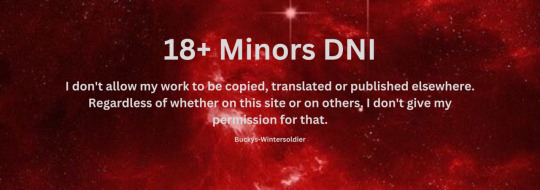

Steve’s arm is around your waist; he wears a blue cap and laughs along with you when you pass a few people. Natasha talks to you over an earpiece, always telling you where the agents are and where you have to go to find out what’s on the stick. Steve and Natasha bought the stick after a mission on a SHIELD ship, which turned out wasn’t a ship belonging to SHIELD.
“To the left!” Natasha says, and the two of you do.
You walk into a small shop for phones and computers, looking around while you find a computer that could work. There are not many people around, so you pull Steve along with you. He smirks at you, even though his heart is just as much beating against his ribcage as yours. But the two of you stay professional enough to not be too nervous. You put the stick into the computer, looking around before you tap something. Just a moment later, there is a map, almost showing you the place where you find a base, which was supposed to be a SHIELD one but probably belongs to Hydra now.
“Front door, six agents; sides, two on each side; and behind the building are also six agents,” Natasha says. “Entering the building now. You have around seven minutes to get out of the store.”
You tap a few more things when a man appears next to you and talks to Steve. He asks him if he could help. Steve’s answer makes you chuckle. He tells him that you both are looking for a good spot for your honeymoon. After another comment from the man who tells Steve he has the same glasses, you almost burst out laughing.
“Siblings,” Natasha says through the earpiece, and you say that out loud.
“Model,” the guy says before he walks away to another customer.
“They are almost in the shop,” Natasha says, and you look back at the computer.
Right when Steve looks at the display as well, the coordinates appear there, and you get the stick back before the two of you make your way out of the shop. Natasha says where the agents are, while Steve and you walk close to each other on the stairs. The agents are all around the mall, and you pull your hood more into your face. Steve's eyes are focused on the ground while you pass some agents. On the stage, you inhale deeply, then you see Rumlow exhaling annoyedly before you turn to Steve.
“Kiss me.”
“What?”
“Now it’s going to be hot,” Nat laughs.
You grasp Steve's shirt and pull him down, pressing your lips on his, and he kisses you back. The kiss gets almost heated, but Natasha is doing a good job to make sure you both don’t get distracted from your job.
“You made a scene, didn’t you?”
You groan playfully while Steve says a quiet yes, nodding his head.
“Steve, how about y/n? You could fit really well,” Natasha says.
You hear her smirk, and when Steve turns his head toward you, his eyes are slightly widening and his cheeks are red.
“I-I mean I-“ Steve mumbles, and you laugh before you lift your hand to his cheek.
You capture it and stand on your tiptoes to reach him. When you lean closer, Steve immediately grasps your waist and pulls him closer against you. Your lips are captured by his while you hear Natasha clapping through the earpiece. You chuckle softly, deepening the kiss. You love the soft, warm feeling of Steve’s lips against yours.
“You should bring the stick now.”
Steve groans and makes both of you laugh.
“Did I step on your moment?” Natasha asks, laughing.
“No, just come and get the stick when you want it,” Steve says, playfully.

Taglist: @kandis-mom @sergeantbarnessdoll @identity2212 @km-ffluv @lunaalovesyouu @blackhawkfanatic @armystay89 @suz7days @felicitylemon @cjand10 @lives-in-midgard @casa-boiardi @cevansbaby-dove @flstrawberry @capsbestgirl77 @bookishtheaterlover7 @rogersbarber @sebastianstanisahotmf
#catws10#mcu#marvel mcu#steve rogers one shot#steve rogers x you#steve rogers fluff#steve rogers x reader#steve rogers fanfiction#steve rogers fic#steve rogers fanfic#steve rogers x yn#steve rogers x f!reader#steve rogers x y/n#steve rogers x female reader#steve x fem reader#steve x female reader#steve x y/n#steve x you#steve x reader#captain america fluff#captain america x reader#captain america one shot#captain america fanfiction#captain america fanfic#captain america x you#captain america x female reader#chris evans character x yn#chris evans character x fem reader#chris evans character x you#chris evans characters
251 notes
·
View notes
Text
ATTENTION ALL MANDALORIAN CREATORS: FREE 3D POV RAZOR CREST MODEL!!!
This is a great rescource I found for anyone who writes or makes art taking place in the ship! It has helped me write more accuratley so its more realistic, and it will greatly help me draw the comic because I can get custom shots and anggles to use as backrounds that are otherwise never shown in the show (I will include some screenshots of cool shots I will be using). And although SOME details are simplified, the main structure of the Crest is accurate and will likley be more than enough for my purposes at least as a base.
https://sketchfab.com/3d-models/the-mandalorian-razor-crest-full-interior-ee72226c953c414ca0b7ab5780fe400a
*Click Settings and click First Person mode to view it all better, Orbit mode sucks.







#mando#the mandolarian#mando fanfiction#mando x reader#fanfic#ao3 fanfic#din djarin#the mandolorian#rough day#drawing#grogu djarin#din dijarin fanfiction#din dijarin x reader#din darjin#clan mudhorn#clan of three#the mandalorian#rough day fanfic#my fic#star wars fanfiction#star wars#sw fanart#mando fanart#mando fic#sw fic#sw fanfic#sw fandom#sweet girl#star wars fanart#star wars art
176 notes
·
View notes
Text
#revell #custom 1/1200 #hmsanson made from a #hmskinggeorgev from #worldwar2 #worldwarii #ww2 #wwii #modelship #battleship #modelbuilding #custommodel #custommodelship
instagram
#revell#custom#hms anson#hms king george v#world war 2#world war ii#ww2#wwii#model ship#custom model ship#battleship#custom model#model planes#model building#original content#Instagram
1 note
·
View note
Text
The Solar Sprint
You ever heard of the Cannonball Run? It was a thing back on earth, back before corpo wars. It was an unsanctioned race across a continent. Folks would trick out cars with extra fuel tanks, police scanners, the works, and just burn their way from one ocean to the other. Driving for something like a day straight, avoiding cops all the way, and only stopping to refuel. Kinda wild, don’t you think? A test of speed and stamina, seeing how hard you could really push your vehicle.
That’s what the Solar Sprint started out as, you know. First time someone ran it, the Jovian blockade was still up. They blew right past the military lines, their mech too fast for any of those combat frames to catch. It was big news at the time, everyone thought it was some secret R.O.M. tech built to break the blockade. Turned out it was just some wrench-head who wanted to see how fast they could get from Mercury to Neptune. The crazy fucker actually did it too, straight shot from the solar collection station on Mercury, all the way to the NDS Research outpost. The scientists there nearly shit themselves when the Runner went blasting past their observatory like that. Can’t imagine they saw any frames out there that weren’t clunky research models before then, especially with the blockade still up.
There’s still footage of the first sprint up on the Net if you look. Some cargo hauler caught footage of the Runner nearly side-swipping his freight ship between Earth and Venus. There was a leaked clip of them breaking the Jovian blockade too, but you might be hard pressed to find that one these days. runners sometimes carry hard copies though, so if you run into the right people you might be able to see it.
It became a whole thing, y’know? Kind of a fuck you to the corps, the wars, all of it. Building frames in a different way, not just for blowing each other up. Was a kind of creative revolution, an expression of freedom. Corps can’t keep us down, yeah? Something like a thousand runners tried it over the next couple years. Not all of em made it; some of em got caught by the blockade, some of em their frames couldn’t handle the trek. But enough of em made it that it started to become a real competition. Who could make the sprint in the fastest time? Folks posted on forums about crazy ideas they were coming up with for propellants, aerodynamics, you name it. Gearheads across the net had a brand new obsession to pour over.
Soon enough though, the corps caught on, realized it was easier to sanction the thing than to try and stop people from doing it. Enough cargo freighters crashed, enough blockades ran, it became more profitable to make an event out of the thing. The Sprint lost some of it’s luster after that. Speed frames plastered with sponsorships and built with corpo parts didn’t really capture the energy of the original run. The yearly Sprint is technically open to public teams, but any self respecting Runner isn’t gonna attempt it during sanctioned times. Kinda defeats the purpose of it all if they clear the shipping lanes and wait for optimal conditions, right?
Every once in a while though, you might spot somebodies custom frame sitting in orbit around the solar collection station. And who knows? They might be the next crazy wrench-head to break that record.
168 notes
·
View notes
Text


Almost done .... almost!
#ship model#custom model#war of 1812#constitution#the art of age of sail#scale model#model design#cherry wood
20 notes
·
View notes
Text
Gainforall - Gold
One of the popular ways to generate passive income online is through affiliate marketing. Affiliate marketing allows individuals to earn a commission by promoting and selling other people's products or services. It provides the potential for passive income as once the initial setup is done, individuals can continue to earn income without actively participating in the sales process . This form of passive income offers flexibility and freedom, allowing individuals to work anytime and from anywhere . The earning potential in affiliate marketing can be significant, with average annual passive income ranging from $37,000 to $51,217. By leveraging the power of affiliate marketing, individuals can build a steady stream of passive income. The allure of affiliate marketing lies in its potential for huge passive income. Another way to generate passive income online is through e-commerce and dropshipping. Dropshipping involves setting up an online store and selling products without having to handle inventory or shipping. The dropshipping business model allows individuals to earn passive income by taking advantage of the difference between the wholesale and retail prices. With persistence and hard work, a dropshipping e-commerce store can become a profitable source of passive income. Additionally, e-commerce platforms like print on demand offer opportunities for individuals to create and sell custom products online, further expanding their passive income potential. Books like "Dropshipping from $0 to $10K a Month" provide valuable insights into building a successful e-commerce business and earning passive income. Creating and selling make money online courses and digital products is another avenue for generating passive income online. Online courses allow individuals to share their knowledge and expertise with others while earning passive income. Selling digital products such as e-books, audiobooks, and digital downloads can also provide a steady stream of passive income. Platforms like Thinkific offer the tools and resources needed to create and sell digital products online. Success stories of individuals making significant passive income selling digital products online highlight the potential of this income stream. Selling online courses and digital products is a relatively simple and realistic way to earn passive income online.
492 notes
·
View notes
Text
What is Palaeoplushies?

Palaeoplushies is a small business run by me, and my sister Sarah helps make things too! My website is www.palaeoplushies.com
We make soft toys/plushies of both extinct and living creatures. It’s a very broad subject matter, I know. It’s usually just animals that interest me (Bex)!
Plushies are made by hand in small batches- they sell out quickly! Designs usually return but there's no set schedule.
You can sign up for restock notifications for individual plushies on my website.
I cannot reserve plushies for people, take payment in advance or personally email/notify individuals when things restock.
We are a very small team. I handle all the product design, manufacture, customer service, paperwork, packaging + posting. Sarah does a lot of sewing too!

I try to get all orders fulfilled and posted within a 7 working days of the order being placed. Sometimes there might be delays, but I’m trying my best.
I'm based in the UK, and world events have meant that shipping is often slow/delayed by customs. This is out of my control, I'm really sorry!
Do I take commissions? No* *Unless it is for Sci-Comm work, in which case I would love to help you out! Got a model organism you'd like to show folks "in person"? I can do that!

1K notes
·
View notes